
Sheepshead is an American trick-taking card game derived from Bavaria's national card game, Schafkopf, hence it is sometimes called American Schafkopf. Sheepshead is most commonly played by five players, but variants exist to allow for two to eight players. There are also many other variants to the game rules, and many slang terms used with the game.
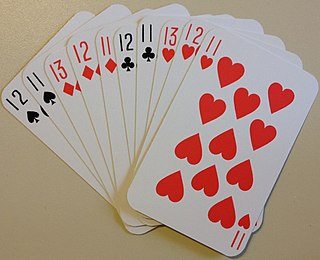
500 or Five Hundred is a trick-taking game developed in the United States from Euchre. Euchre was extended to a 10 card game with bidding and a Misère contract similar to Russian Preference, producing a cutthroat three-player game like Preference and a four-player game played in partnerships like Whist which is the most popular modern form, although with special packs it can be played by up to six players.
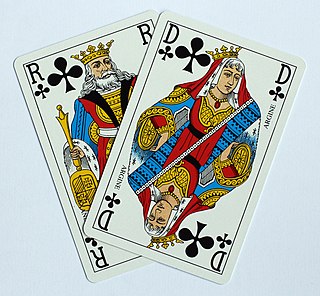
Belote is a 32-card, trick-taking, ace–ten game played primarily in France and certain European countries, namely Armenia, Belgium, Bulgaria, Croatia, Cyprus, Georgia, Greece, Luxembourg, Moldova, North Macedonia, Bosnia and Herzegovina and also in Saudi Arabia and Tunisia. It is one of the most popular card games in those countries, and the national card game of France, both casually and in gambling. It appeared around 1900 in France, and is a close relative of both Klaberjass and klaverjas. Closely related games are played throughout the world. Definitive rules of the game were first published in French in 1921.

Rummoli is a family card game for two to eight people. This Canadian board game, first marketed in 1940 by the Copp Clark Publishing Company of Toronto requires a Rummoli board, a deck of playing cards, and chips or coins to play. The game is usually played for fun, or for small stakes. Rummoli is one of the more popular versions of the Stops Group of matching card games, in particular it falls into a subgroup of stops games based on the German Poch and falls into a family of Poch variants such as the French Nain Jaune, the Victorian Pope Joan but most like the American game Tripoley which debuted eight years earlier in Chicago in 1932.
Catch the ten, also called Scots whist or Scotch whist, is an 18th-century point-trick ace–ten card game that is recorded as being played only in Scotland, although evidence suggests a possible German origin. Unlike standard whist, it is played with a pack of only 36 cards, the fives and below being omitted. In the trump suit, the jack is the highest card. Despite its alternative name, it has nothing to do with standard whist.

Switch is a shedding-type card game for two or more players that is popular in the United Kingdom, Ireland and as alternative incarnations in other regions. The sole aim of Switch is to discard all of the cards in one's hand; the first player to play their final card, and ergo have no cards left, wins the game. Switch is very similar to the games Crazy Eights, UNO, Flaps, Mau Mau or Whot! belonging to the Shedding family of card games.
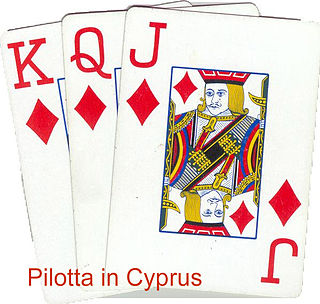
Pilotta (in Greek Πιλόττα) is a trick-taking 32-card game derived from Belote. It is played primarily in Cyprus, being very popular among the Cypriot population, especially the youngsters, who usually arrange “pilotta meetings” in places such as cafés and cafeterias. Its counterpart played in Greece is named Vida.

Konter a Matt, Kontra a Matt or Konter a Midd is a Luxembourgish trick-taking card game played by four players. The game is popular enough to have been televised on RTL, Luxembourg's leading TV station and for tournaments to be organised. Konter a Matt is one of a family of similar games, known as the Couillon Group, played in the Benelux area. Other games in the family include the Belgian game of Couillon, known as Kwajongen in Flemish areas and Kujong in Luxembourg, the Dutch game of Troeven and the Belgian games of Brûte and Gamelle.
Red Nines is a simple card game of the Stops family for four or more players. It is largely a game of luck, and is suitable for players of any age. Games with more than four players are best when played without hesitation. It has a modern variant called Pink Nines.

The following is a glossary of terms used in card games. Besides the terms listed here, there are thousands of common and uncommon slang terms. Terms in this glossary should not be game-specific, but apply to a wide range of card games played with non-proprietary packs. It should not include terms solely related to casino or banking games. For glossaries that relate primarily to one game or family of similar games, see Game-specific glossaries.
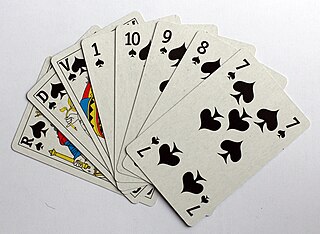
Triomphe, once known as French ruff, is a card game dating from the late 15th century. It most likely originated in France or Spain and later spread to the rest of Europe. When the game arrived in Italy, it shared a similar name with the pre-existing game and deck known as trionfi; probably resulting in the latter becoming renamed as Tarocchi (tarot). While trionfi has a fifth suit that acts as permanent trumps, triomphe randomly selects one of the existing four suits as trumps. Another common feature of this game is the robbing of the stock. Triomphe became so popular that during the 16th century the earlier game of trionfi was gradually renamed tarocchi, tarot, or tarock. This game is the origin of the English word "trump" and is the ancestor of many trick-taking games like Euchre and Whist. The earliest known description of Triomphe was of a point-trick game, perhaps one of the earliest of its type; later, the name was applied to a plain-trick game.
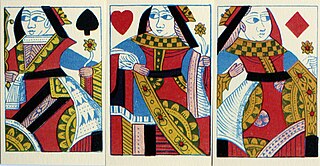
Gleek is an English card game for three people. It is played with a 44-card pack and was popular from the 16th century through the 18th century.

Officers' Skat (Offiziersskat), is a trick-taking card game for two players which is based on the rules of Skat. It may be played with a German or French pack of 32 cards which, from the outset of the game, are laid out in rows both face down and face up. As in Skat, tricks are taken and card points counted to determine the winner of a round; game points are then awarded to decide the winner of a game. There are several local variations of the game, which differ mainly in the number of cards revealed or hidden and the calculation of points.
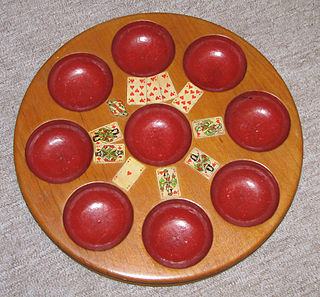
Poch, Pochen or Pochspiel is a very old card game that is considered one of the forerunners of poker, a game that developed in America in the 19th century. An etymological relationship between the game names is also assumed. Games related to Poch are the French Glic and Nain Jaune and the English Pope Joan. Other forerunners of poker and possible relatives of the game are the English game, Brag, from the 16th century and the French Brelan and Belle, Flux et Trente-et-Un. Poch is recorded as early as 1441 in Strasbourg. In north Germany it was called by the Low German name of Puchen or Puchspill, and the board was a Puchbrett.

Newmarket is an English card game of the matching type for any number of players. It is a domestic gambling game, involving more chance than skill, and emerged in the 1880s as an improvement of the older game of Pope Joan. It became known in America as Stops or Boodle before developing into Michigan. In 1981, Newmarket was still the sixth most popular card game in Britain.

The game of Nain Jaune or Yellow Dwarf, also formerly called Lindor, is an "attractive and unique traditional French card game" using a board comprising five compartments or boxes. It is a reasoned game of chance because it combines the hazards of card distribution with the strategy of building suits. Nain Jaune, which is considered a classic French game, is named after the seven of diamonds, which is depicted as a yellow dwarf in the centre of the game board.

The jeux de hocs are a family of French card games in which the aim is to be first to shed all one's hand cards to sequences laid out in rows on the table. They all feature cards known as 'stops' or hocs: cards that end a sequence and give the one who played it the advantage of being able to start a new sequence. In some games, hocs attract bonuses.

Penneech or peneech, sometimes called penicth, is an unusual historical English card game for two players played with hands of seven cards. English point-trick games are rare anyway, but the unique feature of this game is that the trump suit changes with each trick. Parlett describes it as a "jolly little two-hander".
Comet is a very old, French card game of the stops family for 2 to 5 players that is still played today. It was originally called manille, but acquired a new name on the appearance of Halley's comet in 1682. It is not related to the modern trick-taking game also called manille. The American game of commit is an evolution of comet.

Hoc Mazarin, also just Hoc, is an historical French gambling game of the Stops family for two or three players. The game was popular at the court of Versailles in the 17th century and was named after Cardinal Mazarin, chief minister to the King of France.



















